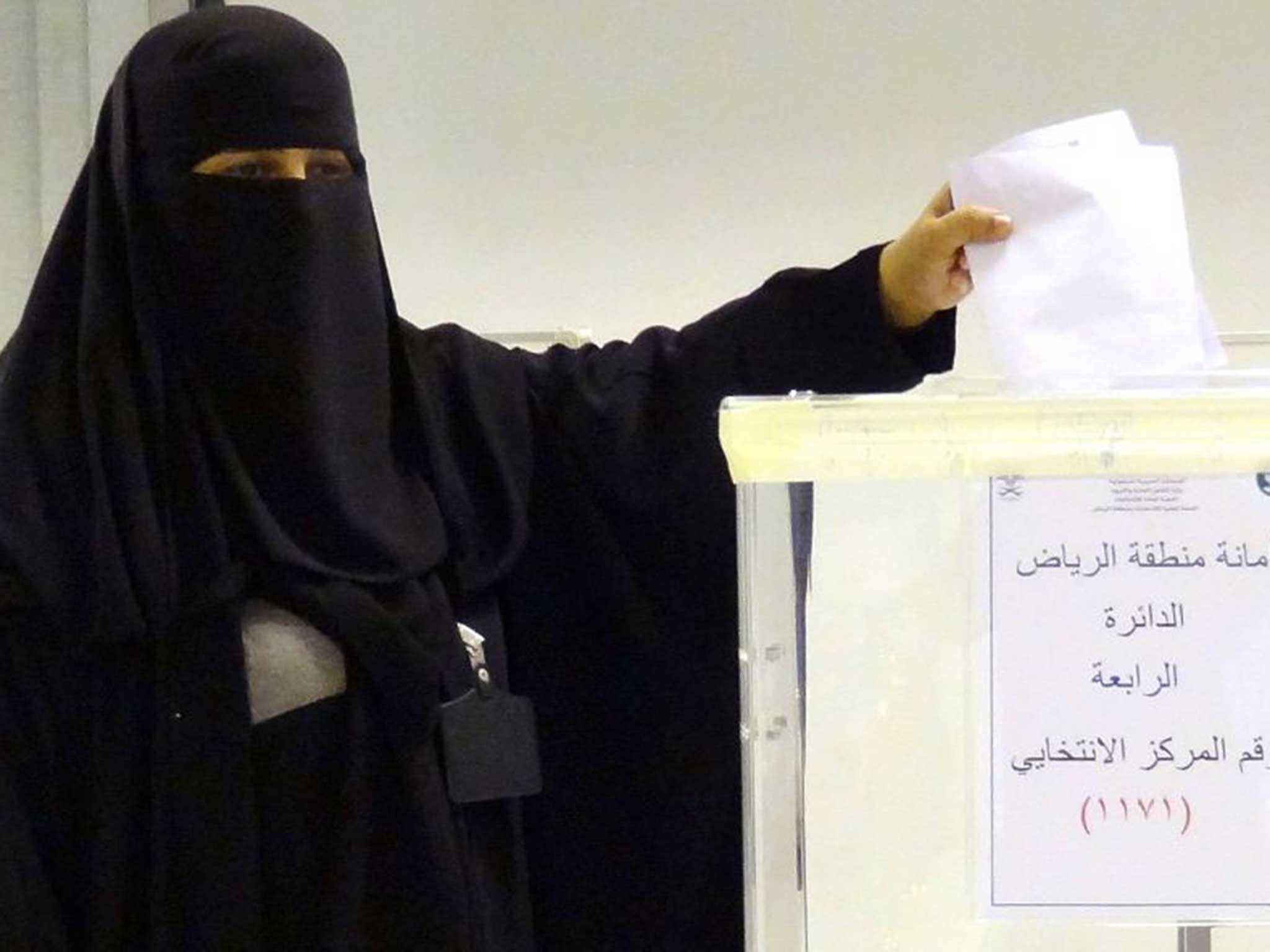Women win 17 seats in Saudi Arabia’s first elections with female candidates
Women were only given the vote this year

Your support helps us to tell the story
From reproductive rights to climate change to Big Tech, The Independent is on the ground when the story is developing. Whether it's investigating the financials of Elon Musk's pro-Trump PAC or producing our latest documentary, 'The A Word', which shines a light on the American women fighting for reproductive rights, we know how important it is to parse out the facts from the messaging.
At such a critical moment in US history, we need reporters on the ground. Your donation allows us to keep sending journalists to speak to both sides of the story.
The Independent is trusted by Americans across the entire political spectrum. And unlike many other quality news outlets, we choose not to lock Americans out of our reporting and analysis with paywalls. We believe quality journalism should be available to everyone, paid for by those who can afford it.
Your support makes all the difference.At least 17 Saudi women have won seats on local municipal councils a day after women voted and ran in elections for the first time in the country’s history, according to initial results released yesterday.
The women hail from vastly different parts of the country, ranging from Saudi Arabia’s second largest and most cosmopolitan city to a small village near Islam’s holiest sites. Though not many women were expected to win seats, even limited gains are seen as a step forward for women who had previously been shut out of elections.
Huda al-Jeraisy, who as the daughter of a former head of the chamber of commerce in the conservative central part of the kingdom was seen by some Saudis as imparting an official stamp of approval on women’s candidature, won a seat in Riyadh.
The Mayor of Mecca, Osama al-Bar, said that candidate Salma al-Oteibi won in a village called Madrakah, about 93 miles north of the city which houses the cube-shaped Kaaba to which Muslims around the world pray.
Mr Bar also confirmed through election officials in Saudi Arabia’s second largest city of Jiddah that another female candidate, Lama al‑Sulaiman, had won a seat there.
The official Saudi Press Agency, meanwhile, quoted the head of the election committee in the northern region of al-Jawf as saying that candidate Hinuwf al-Hazmi won along with 13 men in that district. The news agency also reported that Mona el-Emery and Fadhila al-Attawy had won in the north-western region of Tabuk. Sabq.org, a news website affiliated with the autocratic monarchy’s interior ministry, reported that a total of 17 women had been elected in various parts of the country.
Overall results from the capital, Riyadh, and other major regions were expected to be announced on Sunday by the General Election Commission. Many female candidates ran on platforms that promised more nurseries to offer longer childcare hours for working mothers, the creation of youth centres with sports and cultural activities, improved roads, better garbage collection and overall greener cities.
In October, the Saudi Gazette reported that harsh road conditions and long distances to the nearest hospital had forced some women in the village of Madrakah, where one female candidate was elected, to give birth in cars. The local newspaper reported that the closest hospital and the nearest university were in Mecca, prompting some students to forgo attending classes. The article said residents were also frustrated with the lack of parks in the village.
It is precisely these kinds of community issues that female candidates hope to address once elected to the municipal councils. The councils do not have legislative powers, but advise authorities and help oversee local budgets.
Under King Abdullah, who died in January but announced in 2011 that women would be able to vote in this election, steps were taken for women to have a bigger public role, sending more of them to university and encouraging female employment.
Around 7,000 candidates, among them 979 women, were competing for 2,100 seats across the country. The councils are the only government body elected by Saudi citizens. The two previous rounds of voting for the councils, in 2005 and 2011, were open to men only.
More than 1.35 million men had registered to vote this time around compared with a little more than 130,000 female registered voters.
In Jiddah, three generations of women from the same family cast ballots for the first time. The oldest woman in the family was 94-year-old Naela Mohammad Nasief. Her daughter, Sahar Hassan Nasief, said the experience marked “the beginning” of greater rights for women in Saudi Arabia, who are not allowed to drive and are governed by laws that give men the ultimate say over aspects of their lives like marriage, travel and higher education.
“I walked in and said ‘I’ve never seen this before. Only in the movies’,” the daughter said, referring to the ballot box.
AP; Reuters
Join our commenting forum
Join thought-provoking conversations, follow other Independent readers and see their replies
Comments